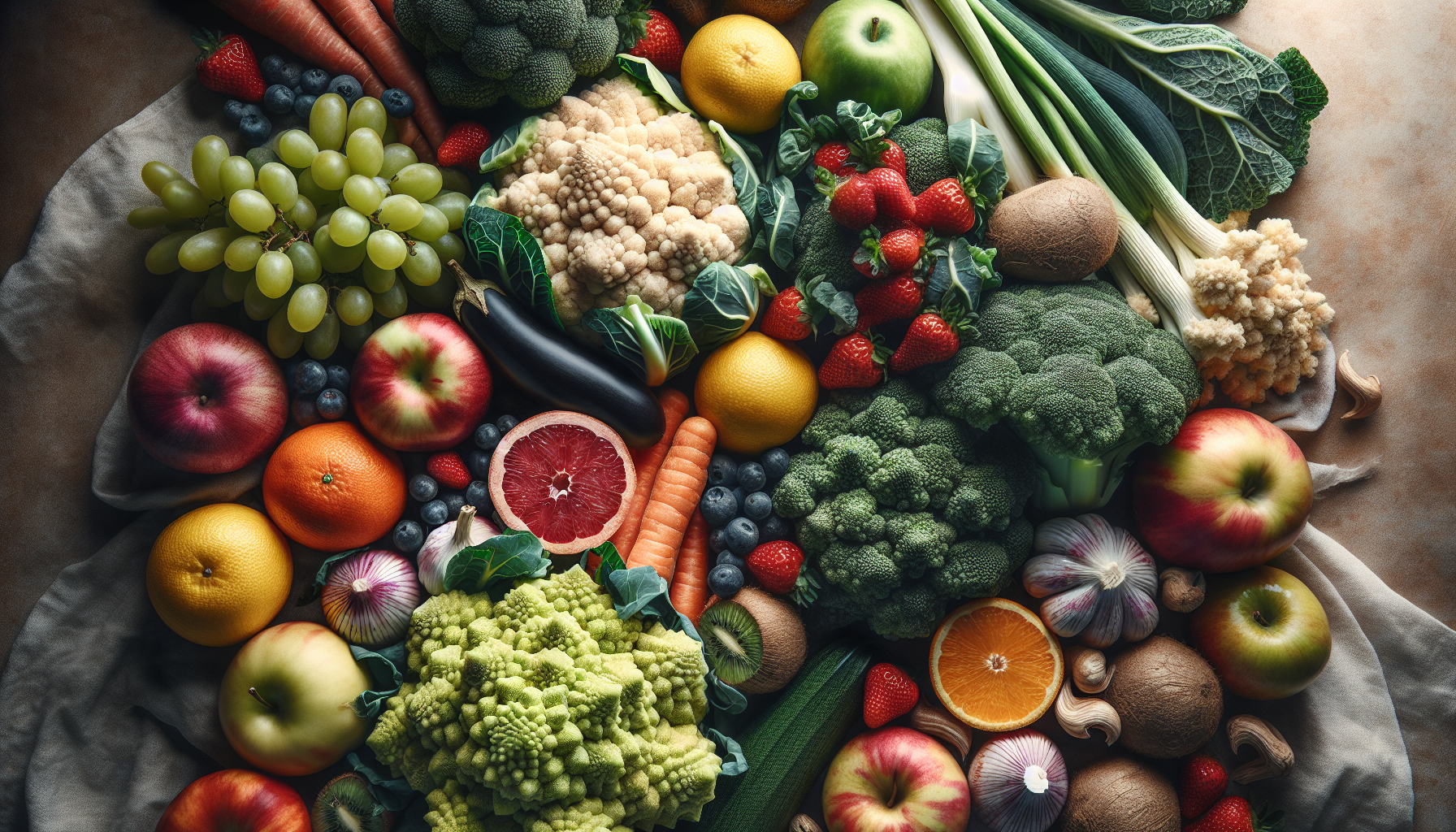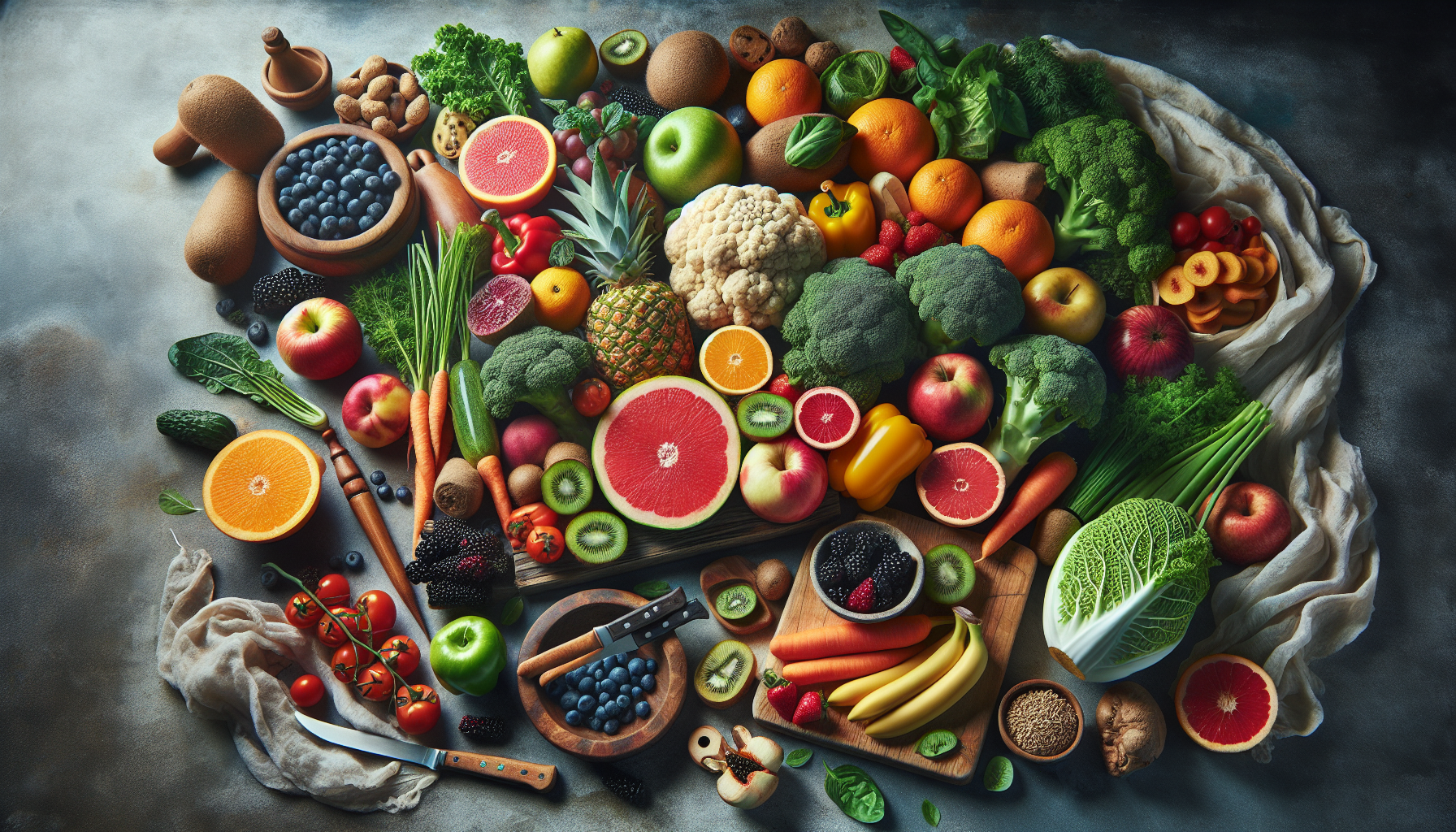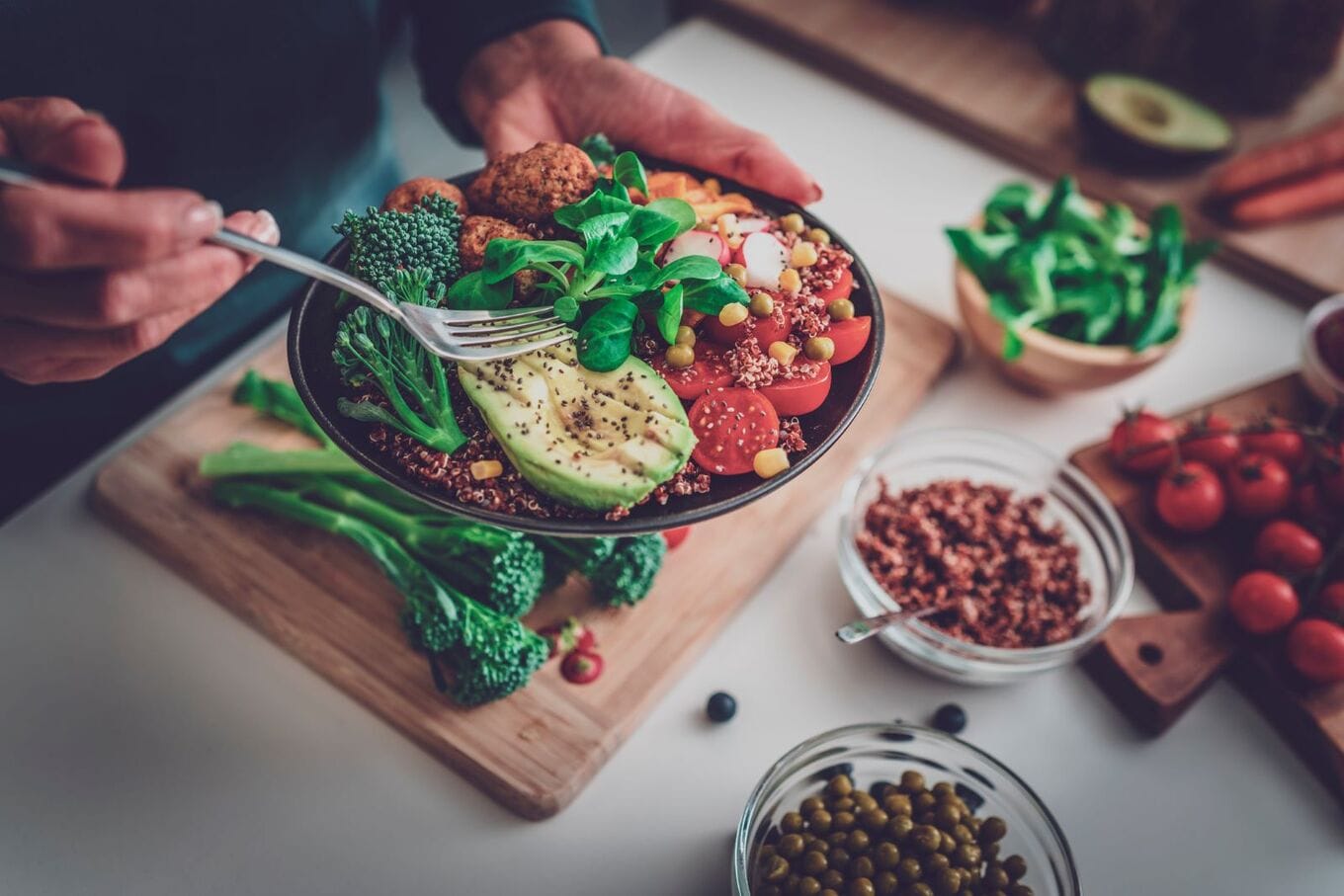So, you’ve heard the term “raw vegan” floating around, but you’re not quite sure what it means? Well, in a nutshell, a raw vegan lifestyle is all about embracing the power of natural foods in their purest form. It’s a way of eating that focuses on consuming unprocessed and uncooked plant-based foods, such as fruits, vegetables, nuts, and seeds. By choosing to follow this lifestyle, you’re not only nourishing your body with vibrant, nutrient-dense foods, but you’re also reducing your carbon footprint, promoting animal welfare, and potentially reaping numerous health benefits. Intrigued to learn more? Let’s dig in! A raw vegan lifestyle is a dietary approach that focuses on consuming unprocessed plant-based foods in their natural state. It involves a commitment to eating only raw fruits, vegetables, nuts, seeds, and sprouted grains, while excluding any animal products or foods that have been cooked or processed. The goal of a raw vegan lifestyle is to promote health and wellness by harnessing the nutrients and enzymes present in uncooked plant foods.

Table of Contents
Definition of a Raw Vegan
A raw vegan is an individual who follows a diet consisting of raw, uncooked, and unprocessed plant-based foods. This means that they do not consume any animal products, including meat, fish, eggs, or dairy. Additionally, a raw vegan avoids foods that have been cooked at high temperatures, as heating can damage the nutrients and enzymes found in raw foods. Instead, the focus is on consuming foods in their natural and whole state to maximize nutritional benefits.
Key Principles of Raw Veganism
There are several key principles that underpin the raw vegan lifestyle. Firstly, it emphasizes the consumption of whole, unprocessed plant foods as the main source of nutrition. This includes fruits, vegetables, nuts, seeds, and sprouted grains. Secondly, raw vegans believe in the importance of eating foods in their natural state to preserve their nutritional value and beneficial enzymes. Lastly, raw veganism is centered around the idea of promoting overall health and well-being by fueling the body with nutrient-dense, uncooked plant-based foods.
Benefits of a Raw Vegan Lifestyle
Improved Digestion
One of the key benefits of a raw vegan lifestyle is improved digestion. Raw foods are rich in fiber, which aids in proper digestion and prevents constipation. Additionally, the enzymes present in raw foods help break down nutrients more efficiently, allowing for better absorption and utilization by the body. This can lead to reduced bloating, increased regularity, and overall digestive comfort.
Increased Energy Levels
Following a raw vegan lifestyle can also result in increased energy levels. Raw foods contain natural sugars and complex carbohydrates that provide a sustained release of energy throughout the day. Additionally, the high vitamin and mineral content in raw plant foods nourish the body and support optimal energy production. Many raw vegans report feeling more alert, focused, and energized after adopting this lifestyle.
Weight Loss
Weight loss is another potential benefit of a raw vegan lifestyle. Raw plant foods are typically low in calories and high in fiber, making them filling without contributing excess calories. Additionally, cutting out processed foods and animal products can lead to weight loss due to reduced consumption of unhealthy fats and empty calories. Many individuals find that adopting a raw vegan diet helps them achieve and maintain a healthy weight.
Clearer Skin
Eating a raw vegan diet can also contribute to clearer skin. Raw fruits and vegetables are rich in essential vitamins, minerals, and antioxidants that nourish the skin and promote a healthy complexion. The high water content in raw foods also helps hydrate the skin and flush out toxins. Many raw vegans report experiencing a reduction in acne, improved skin texture, and a natural glow after adopting this lifestyle.
Reduced Risk of Chronic Diseases
Following a raw vegan lifestyle has been associated with a reduced risk of chronic diseases. Raw plant foods are packed with antioxidants, phytochemicals, and other beneficial compounds that protect against cell damage and inflammation. The high intake of fruits and vegetables, which are abundant in a raw vegan diet, has been linked to a lower risk of heart disease, certain cancers, and other chronic conditions. By prioritizing nutrient-dense, uncooked plant foods, individuals can support their overall health and potentially prevent the onset of disease.
Foods Included in a Raw Vegan Diet
A raw vegan diet primarily consists of fresh fruits, vegetables, nuts, seeds, sprouts, seaweed, and fermented foods. Let’s take a closer look at each of these food groups:
Fresh Fruits
Fresh fruits are a staple in a raw vegan diet. They are naturally sweet, hydrating, and packed with essential vitamins, minerals, and antioxidants. Some popular fruit choices include apples, bananas, oranges, berries, and melons. Fruits can be consumed raw, juiced, or blended into smoothies for a refreshing and nutritious treat.
Vegetables
Vegetables are the foundation of a raw vegan diet. They provide a wide range of vitamins, minerals, and fiber. Leafy greens like spinach, kale, and romaine lettuce are excellent choices. Other vegetables such as cucumbers, bell peppers, tomatoes, and carrots can be enjoyed raw in salads, wraps, or as crunchy snacks.
Nuts and Seeds
Nuts and seeds are important sources of healthy fats, protein, and various micronutrients in a raw vegan diet. Almonds, walnuts, cashews, chia seeds, flaxseeds, and hemp seeds are popular choices. They can be enjoyed as a snack, added to salads or desserts, or used to make homemade nut milks and seed-based dips.
Sprouts
Sprouts are germinated seeds or grains that have just begun to grow. They are highly nutritious and are rich in enzymes, vitamins, and minerals. Common sprouts include alfalfa sprouts, broccoli sprouts, and mung bean sprouts. Sprouts can be added to salads, sandwiches, or used as a crunchy topping for various dishes.
Seaweed
Seaweed is a nutrient-dense food commonly consumed in Asian cuisine and is a valuable addition to a raw vegan diet. It is a rich source of iodine, vitamins, minerals, and antioxidants. Varieties such as nori, dulse, and kelp can be enjoyed raw as snacks, added to raw sushi rolls, or used as a seasoning in soups and salads.
Fermented Foods
Fermented foods play an essential role in a raw vegan diet as they provide beneficial probiotics and enzymes. Fermented foods include sauerkraut, kimchi, coconut yogurt, and fermented nut cheeses. These foods support gut health, digestion, and immune function. Incorporating fermented foods into a raw vegan diet can help maintain a healthy balance of gut bacteria.

Foods Excluded from a Raw Vegan Diet
A raw vegan diet involves avoiding specific food groups and categories. Here are the main foods excluded from a raw vegan lifestyle:
Animal Products
As a raw vegan, you do not consume any animal products, including meat, poultry, fish, eggs, and dairy. This exclusion aligns with the ethical aspect of veganism and the belief that plant-based foods are sufficient to meet all nutritional needs.
Processed Foods
Processed foods, including packaged snacks, refined oils, sugary drinks, and convenience meals, are not part of a raw vegan lifestyle. These foods tend to be high in unhealthy fats, added sugars, and artificial ingredients. The focus is on whole, natural foods rather than heavily processed options.
Refined Sugar and Flour
Refined sugar and flour are also excluded from a raw vegan diet. These substances have been stripped of their nutrients and can lead to spikes in blood sugar levels. Instead, raw vegans opt for natural sweeteners like dates, agave nectar, or raw honey, and utilize alternatives to traditional flour, such as almond flour or coconut flour.
Cooked Foods
Cooked foods, regardless of their healthiness, are not consumed in a raw vegan lifestyle. The belief is that cooking food at high temperatures destroys essential enzymes and diminishes its nutritional value. Hence, raw vegans consume foods in their uncooked and unheated state to maximize their nutritional benefits.
Preparation Techniques in Raw Veganism
In a raw vegan lifestyle, certain preparation techniques are employed to enhance the flavors and textures of raw foods while preserving their nutritional integrity. These techniques include:
Juicing
Juicing involves extracting the liquid from fruits and vegetables, leaving behind the pulp. This allows for easy consumption of a concentrated amount of vitamins, minerals, and enzymes. Freshly made juices can be enjoyed as a standalone beverage or used as a base for smoothies or soups.
Blending
Blending is a popular technique in raw veganism as it helps retain the fiber content of fruits and vegetables while creating a smooth and creamy texture. Smoothies made from a combination of fruits, leafy greens, and water or plant-based milk provide a quick and convenient way to consume a variety of nutrients in one sitting.
Soaking and Sprouting
Soaking and sprouting are methods used to enhance the digestibility and nutrient content of certain foods. Soaking nuts, seeds, or grains in water can help remove enzyme inhibitors and activate beneficial enzymes, making them easier to digest. Sprouting involves allowing seeds or grains to germinate and grow tiny shoots, which increases their nutrient availability and breaks down complex carbohydrates and proteins.
Dehydrating
Dehydrating is a technique used to remove moisture from foods while keeping the temperature low, typically below 115°F (46°C). This preserves the natural enzymes and nutrients, resulting in foods with a crispy texture. Dehydrators are commonly used to make raw crackers, fruit leather, kale chips, and other dehydrated snacks.
Fermentation
Fermentation is a process that involves the conversion of sugars in food by beneficial bacteria and yeasts, resulting in the production of probiotics and enzymes. Raw vegans can ferment foods like vegetables, fruits, and nuts to enhance their flavor profile and increase their nutritional benefits. Fermented foods such as sauerkraut, kimchi, and kombucha are excellent sources of probiotics and are an integral part of a raw vegan diet.
Getting Sufficient Nutrients
One concern often raised about a raw vegan lifestyle is whether it provides sufficient nutrients. However, with proper planning and food choices, it is possible to meet nutritional needs. Let’s explore the key nutrients to consider:
Protein
Protein can be obtained on a raw vegan diet from sources such as nuts, seeds, sprouts, and leafy greens. While plant-based proteins may have a slightly different amino acid profile compared to animal proteins, a varied and balanced raw vegan diet can provide all the essential amino acids needed for optimal health.
Calcium
Calcium, which is essential for bone health, can be obtained from plant-based sources such as leafy greens, sesame seeds, almonds, and fortified plant-based milks. While raw vegan sources of calcium might not be as high in concentration as dairy products, the body can still absorb and utilize this vital mineral from plant-based sources.
Iron
Iron is an important micronutrient involved in oxygen transport within the body. Plant-based sources of iron include leafy greens, beans, lentils, fortified cereals, and dried fruits. To enhance iron absorption, it is recommended to consume vitamin C-rich foods alongside iron-rich foods.
Vitamin B12
Vitamin B12 is primarily found in animal products and can be challenging to obtain on a raw vegan diet. As a result, raw vegans often rely on food sources fortified with vitamin B12 or consider supplementation to ensure adequate intake. Consulting with a healthcare professional is advisable to determine the most appropriate approach.
Omega-3 Fatty Acids
Omega-3 fatty acids, particularly EPA and DHA, are commonly found in fatty fish. However, vegan sources of omega-3s, such as flaxseeds, chia seeds, and walnuts, can provide the precursor alpha-linolenic acid (ALA) which the body can partially convert into EPA and DHA. It may be necessary for raw vegans to consider plant-based omega-3 supplements or algae-derived DHA to meet their needs.
Tips for a Successful Transition to a Raw Vegan Lifestyle
Transitioning to a raw vegan lifestyle can be a gradual process. Here are a few tips to help you navigate this lifestyle change:
Educate Yourself
Before embarking on a raw vegan lifestyle, educate yourself about proper nutrition, meal planning, and potential challenges. Understanding the principles and potential benefits of raw veganism will help you make informed decisions and set realistic expectations.
Gradual Transition
Instead of making sudden and drastic changes, consider gradually incorporating more raw vegan foods into your diet. Begin by adding one raw meal or snack per day and gradually increase the proportion of raw foods over time. This allows your body and taste buds to adjust gradually.
Experiment with Recipes
To make the transition more enjoyable, experiment with different raw vegan recipes and cooking techniques. The internet is a valuable resource for finding creative and delicious raw vegan recipes. Try new dishes, flavors, and combinations to discover what you enjoy most.
Stay Hydrated
Raw foods often have a high water content, which can contribute to hydration. However, it is important to maintain adequate hydration throughout the day. Be mindful of your water intake and consider incorporating herbal teas or infused water to add flavor and variety.
Seek Support
Consider connecting with others who have experience or knowledge about the raw vegan lifestyle. Online forums, social media groups, and local communities can provide support, advice, and inspiration as you embrace this lifestyle. Sharing experiences and tips with like-minded individuals can make the journey more enjoyable and sustainable.
Challenges of a Raw Vegan Lifestyle
While there are numerous benefits to a raw vegan lifestyle, it is important to be aware of potential challenges that may arise:
Limited Food Choices
Following a raw vegan lifestyle may initially feel restrictive, as it eliminates certain food groups and cooking techniques. It requires creativity and exploration of new flavors and ingredients to diversify meals and avoid monotony. With time and experience, however, you will discover a wide variety of options and find your own unique ways to enjoy raw vegan cuisine.
Social Challenges
Eating raw vegan can be challenging in social settings, especially when dining out or attending events where cooked or processed foods are prevalent. Communicate your dietary preferences to friends and family in advance to ensure there are suitable options available, and consider bringing your own dishes if necessary. Remember, the focus is on your well-being, so don’t be afraid to advocate for your food choices.
Potential Nutrient Deficiencies
While it is possible to obtain all essential nutrients on a raw vegan diet, it requires careful planning and attention to ensure a balanced intake. Pay close attention to nutrients that may be more challenging to obtain, such as vitamin B12 and omega-3 fatty acids, and consider appropriate supplementation or fortified foods to meet your needs.
Time and Effort Required
Preparing raw vegan meals often requires more time and effort compared to traditional cooking methods. Soaking, sprouting, chopping, and dehydrating can be time-consuming processes. However, with good planning, batch preparation, and the right kitchen tools, you can streamline the food preparation process and make it more efficient.
Expense
A raw vegan lifestyle can be more expensive compared to a standard diet due to the emphasis on whole, fresh, and organic ingredients. However, there are ways to optimize costs, such as buying seasonal produce, buying in bulk, and incorporating cost-effective staples like beans, lentils, and seeds. It is possible to find a balance that suits your budget while nourishing your body with high-quality foods.
Potential Risks and Considerations
While a raw vegan lifestyle can offer numerous benefits, it is essential to consider potential risks and individual needs. Here are a few factors to keep in mind:
Nutrient Deficiencies
As mentioned earlier, certain nutrients may be more challenging to obtain on a raw vegan diet. Regular monitoring of nutrient levels and potential supplementation may be necessary to ensure optimal health. Consulting with a healthcare professional or registered dietitian who specializes in plant-based nutrition can provide personalized advice and guidance.
Difficulty Meeting Calorie Needs
Raw foods, particularly fruits and vegetables, are often less calorie-dense compared to cooked and processed foods. Individuals with high energy needs, such as athletes or those with specific health conditions, may find it challenging to consume enough calories solely from raw foods. It is crucial to ensure adequate calorie intake to support energy levels, physical activity, and overall health.
Food Safety Concerns
While raw foods are generally safe, there is an increased risk of foodborne illnesses due to potential contamination from pathogens such as bacteria and parasites. Proper food handling and hygiene practices, such as washing produce thoroughly and storing food at appropriate temperatures, are important to minimize these risks.
Personalized Approach
The raw vegan lifestyle may not be suitable for everyone. Body type, genetic factors, and individual health conditions can influence the appropriateness of this dietary approach. It is essential to listen to your body’s needs, consult with healthcare professionals, and make adjustments as necessary to ensure your well-being.
Conclusion
A raw vegan lifestyle offers a unique and health-conscious way of eating that prioritizes fresh, unprocessed, and nutrient-dense plant-based foods. By consuming foods in their natural state, you can benefit from improved digestion, increased energy levels, weight loss, clearer skin, and reduced risk of chronic diseases.
The raw vegan diet includes a wide range of fruits, vegetables, nuts, seeds, sprouts, seaweed, and fermented foods. While certain food groups, such as animal products, processed foods, refined sugar, and cooked foods, are excluded, there are plenty of delicious and nutritious options available.
Transitioning to a raw vegan lifestyle requires proper education, gradual changes, and experimentation with recipes. Nutrient needs, such as protein, calcium, iron, vitamin B12, and omega-3 fatty acids, should be carefully considered and met through food choices or supplementation.
While there are challenges associated with a raw vegan lifestyle, such as limited food choices, social situations, potential nutrient deficiencies, time, effort, and expense, with planning and support, these challenges can be overcome.
As with any dietary decision, it is important to consider potential risks, individual needs, and consult with healthcare professionals to ensure that the raw vegan lifestyle is suitable for you. With careful consideration and personalization, embracing a raw vegan lifestyle can be a fulfilling and rewarding journey towards optimal health and well-being.






